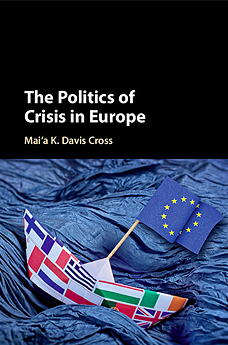[Mai’a K. Davis Cross, The Politics of Crisis in Europe. Cambridge, United Kingdom: Cambridge University Press. 2017. 248 pages]
REVIEW / M. Teresa La Porte [Spanish version]
The main thesis of the extensive research that this work represents is condensed in its final conclusions: ‘Indeed, what the crisis over Iraq, the constitution, and the Eurozone have revealed is that even in the face of extreme adversity, and even when the easy route of freezing or rolling back integration is on the table before them, Europeans routinely choose more Europe, not less’ (p. 235). The author justifies this affirmation arguing that the perception of the existential crisis that periodically attacks the European Union is a social construct, initiated and orchestrated by the communication media and public opinion shapers that control the development of the narratives and determine the public perception of the events. The media coverage amplifies a problem which, though it is undeniable, does not question the existence of the European Union. This negative vision causes in the citizenry what Cross calls ‘integrational panic’, generating a sentiment of catastrophe that is multiplied through political discourse. The absence of the “real crisis” is demonstrated by the fact that, behind these apparent catastrophes, an evident advance in European integration and a renewed desire to find consensus are produced.
The book presents an analysis of the three recent “crises” through which the European Union has passed: the dispute relating to the participation of the war in Iraq (2003), the debate about the European Constitution (2005) and the economic crisis of the Eurozone (2010-12). Each of these cases are comprised of a qualitative and quantitative study of the leading international media, an examination of the reaction of public opinion and a monitoring of the political decisions that were made. In spite of the differences among the cases of the study, the author finds a common pattern in all of them that allows for a comparative study and that develops in the following way: emergence of a conflict that provokes a debate, negative reaction of social instigators producing alarming narratives, perception of existential crisis on the part of the citizenry, state of catharsis in which the tensions are relaxed and a calm reflection over the events is produced, and, finally, the phase of resolution in which political measures are adopted that reinforce European integration (European Security Strategy, 2003; Lisbon Treaty, 2009; Fiscal Compact, 2012).
 |
The European Union is understood as ‘a work in progress, a project that is perennially in the middle of its evolution, with no clearly defined end goal’ (p.2). The disagreements among the member states, in relation to foreign policy or the degree of integration, are typical of an ambitious initiative, which is in full process of maturation and which goes forward always counting on the judgement of each and every one of its members. Nevertheless, the study does not underestimate the real difficulties that the communal institution is going through and they are present throughout the research.
What is especially interesting is the thorough tracking of the social dynamics that are generated by the ‘crisis of existence’ of the European Union. The processes of the development of the narratives by the media, the multiplying effect through the discourses of political actors and experts, and the reaction of European and global public opinion provide knowledge about the political impact of social behaviour that should be taken more into consideration in the discipline of international relations. The study gives special attention to the resolution of the crisis and the phenomenon of ‘catharsis’ which is produced as a consequence of political reflection. This stage would begin when the options are broadened and different solutions begin to be valued, the political elites recover their power of decision-making and the consideration of potential opportunities to generate consensus and advance in integration is begun. As the author emphasizes, catharsis does not eliminate tensions, but it allows for an open debate that concludes with a positive proposal.
Another positive contribution is the scientific revision of the concept of ‘crisis’ in the principal intellectual perspectives of the material: the systematic vision, the behavioural and the sociological vision. Based on the previous production, the author provides a new concept, ‘integrational panic’, that is defined as ‘a social overreaction to a perceived problem’.
The criticism coming from the academic sphere, although it highlights the interest of the focus of the work, considers the political analysis of each of the conflicts analysed to be insufficient and affirms that the book does not reflect very well the complexity of the problems that confront Europe. Specifically, it is questioned whether the crisis of Brexit and the emergence of Eurosceptic parties does not dismantle the argumentation presented in these pages. The author includes a brief commentary about both questions (the British referendum coincides with the publication of the book) arguing that both problems respond to a conflict of national, and not European, politics, but the criticism considers it incomplete.
In any case the relevance of the work is justified for various reasons. In the first place, its novelty: although the crises through which the European Union has passed have been studied previously, there are very few studies which have done it in a comparative way and concluding on common behaviours. Secondly, and although it may be a debatable thesis, the analysis of the effect of the media and of the leaders of public opinion in the existential crises of the EU contributes a political assessment of the phenomenon that is more accurate and realistic. Finally, the research favours a better management of these periods of turbulence, allowing for a reduction of the wearing effects of a constant debate over the survival of the institution within and outside of Europe.